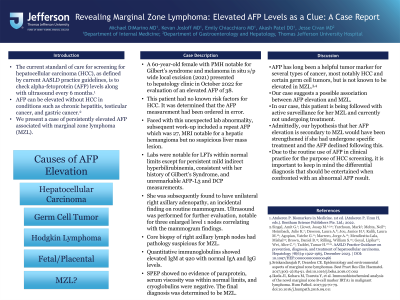Sunday Poster Session
Category: Liver
P1427 - Revealing Marginal Zone Lymphoma: Elevated AFP Levels as a Clue: A Case Report
Sunday, October 27, 2024
3:30 PM - 7:00 PM ET
Location: Exhibit Hall E

Has Audio

Michael J. DiMarino, MD
Thomas Jefferson University Hospital
Philadelphia, PA
Presenting Author(s)
Michael J. DiMarino, MD1, Kevan Josloff, MD, MPH1, Emily Chiacchiaro, MD1, Akash Patel, DO1, Jesse M. Civan, MD2
1Thomas Jefferson University Hospital, Philadelphia, PA; 2Sidney Kimmel Medical College at Thomas Jefferson University, Philadelphia, PA
Introduction: The current standard of care for screening for hepatocellular carcinoma (HCC), as defined by current AASLD practice guidelines, is to check alpha-fetoprotein (AFP) levels along with ultrasound every 6 months. AFP can be elevated without HCC in conditions such as chronic hepatitis, testicular cancer, and gastric cancer. We present a case of persistently elevated AFP associated with marginal zone lymphoma (MZL).
Case Description/Methods: A 60-year-old female with PMH notable for Gilbert’s syndrome and melanoma in situ s/p wide local excision (2021) presented to hepatology clinic in October 2022 for evaluation of an elevated AFP of 38. This patient had no known risk factors for HCC. It was determined that the AFP measurement had been ordered in error. Faced with this unexpected lab abnormality, subsequent work-up included a repeat AFP which was 27, MRI notable for a hepatic hemangioma but no suspicious liver mass lesion. Labs were notable for LFTs within normal limits except for persistent mild indirect hyperbilirubinemia, consistent with her history of Gilbert’s Syndrome, and unremarkable AFP-L3 and DCP measurements. She was subsequently found to have unilateral right axillary adenopathy, an incidental finding on routine mammogram. Ultrasound was performed for further evaluation, notable for three enlarged level 1 nodes correlating with the mammogram findings. Core biopsy of right axillary lymph nodes had pathology suspicious for MZL. Quantitative immunoglobulins showed elevated IgM at 920 with normal IgA and IgG levels. SPEP showed no evidence of paraprotein, serum viscosity was within normal limits, and cryoglobulins were negative. The final diagnosis was determined to be MZL.
Discussion: AFP has long been a helpful tumor marker for several types of cancer, most notably HCC and certain germ cell tumors, but is not known to be elevated in MZL. Our case suggests a possible association between AFP elevation and MZL. In our case, this patient is being followed with active surveillance for her MZL and currently not undergoing treatment. Admittedly, our hypothesis that her AFP elevation is secondary to MZL would have been strengthened if she had undergone specific treatment and the AFP declined following this. Due to the routine use of AFP in clinical practice for the purpose of HCC screening, it is important to keep in mind the differential diagnosis that should be entertained when confronted with an abnormal AFP result.
Disclosures:
Michael J. DiMarino, MD1, Kevan Josloff, MD, MPH1, Emily Chiacchiaro, MD1, Akash Patel, DO1, Jesse M. Civan, MD2. P1427 - Revealing Marginal Zone Lymphoma: Elevated AFP Levels as a Clue: A Case Report, ACG 2024 Annual Scientific Meeting Abstracts. Philadelphia, PA: American College of Gastroenterology.
1Thomas Jefferson University Hospital, Philadelphia, PA; 2Sidney Kimmel Medical College at Thomas Jefferson University, Philadelphia, PA
Introduction: The current standard of care for screening for hepatocellular carcinoma (HCC), as defined by current AASLD practice guidelines, is to check alpha-fetoprotein (AFP) levels along with ultrasound every 6 months. AFP can be elevated without HCC in conditions such as chronic hepatitis, testicular cancer, and gastric cancer. We present a case of persistently elevated AFP associated with marginal zone lymphoma (MZL).
Case Description/Methods: A 60-year-old female with PMH notable for Gilbert’s syndrome and melanoma in situ s/p wide local excision (2021) presented to hepatology clinic in October 2022 for evaluation of an elevated AFP of 38. This patient had no known risk factors for HCC. It was determined that the AFP measurement had been ordered in error. Faced with this unexpected lab abnormality, subsequent work-up included a repeat AFP which was 27, MRI notable for a hepatic hemangioma but no suspicious liver mass lesion. Labs were notable for LFTs within normal limits except for persistent mild indirect hyperbilirubinemia, consistent with her history of Gilbert’s Syndrome, and unremarkable AFP-L3 and DCP measurements. She was subsequently found to have unilateral right axillary adenopathy, an incidental finding on routine mammogram. Ultrasound was performed for further evaluation, notable for three enlarged level 1 nodes correlating with the mammogram findings. Core biopsy of right axillary lymph nodes had pathology suspicious for MZL. Quantitative immunoglobulins showed elevated IgM at 920 with normal IgA and IgG levels. SPEP showed no evidence of paraprotein, serum viscosity was within normal limits, and cryoglobulins were negative. The final diagnosis was determined to be MZL.
Discussion: AFP has long been a helpful tumor marker for several types of cancer, most notably HCC and certain germ cell tumors, but is not known to be elevated in MZL. Our case suggests a possible association between AFP elevation and MZL. In our case, this patient is being followed with active surveillance for her MZL and currently not undergoing treatment. Admittedly, our hypothesis that her AFP elevation is secondary to MZL would have been strengthened if she had undergone specific treatment and the AFP declined following this. Due to the routine use of AFP in clinical practice for the purpose of HCC screening, it is important to keep in mind the differential diagnosis that should be entertained when confronted with an abnormal AFP result.
Disclosures:
Michael DiMarino indicated no relevant financial relationships.
Kevan Josloff indicated no relevant financial relationships.
Emily Chiacchiaro indicated no relevant financial relationships.
Akash Patel indicated no relevant financial relationships.
Jesse Civan indicated no relevant financial relationships.
Michael J. DiMarino, MD1, Kevan Josloff, MD, MPH1, Emily Chiacchiaro, MD1, Akash Patel, DO1, Jesse M. Civan, MD2. P1427 - Revealing Marginal Zone Lymphoma: Elevated AFP Levels as a Clue: A Case Report, ACG 2024 Annual Scientific Meeting Abstracts. Philadelphia, PA: American College of Gastroenterology.
